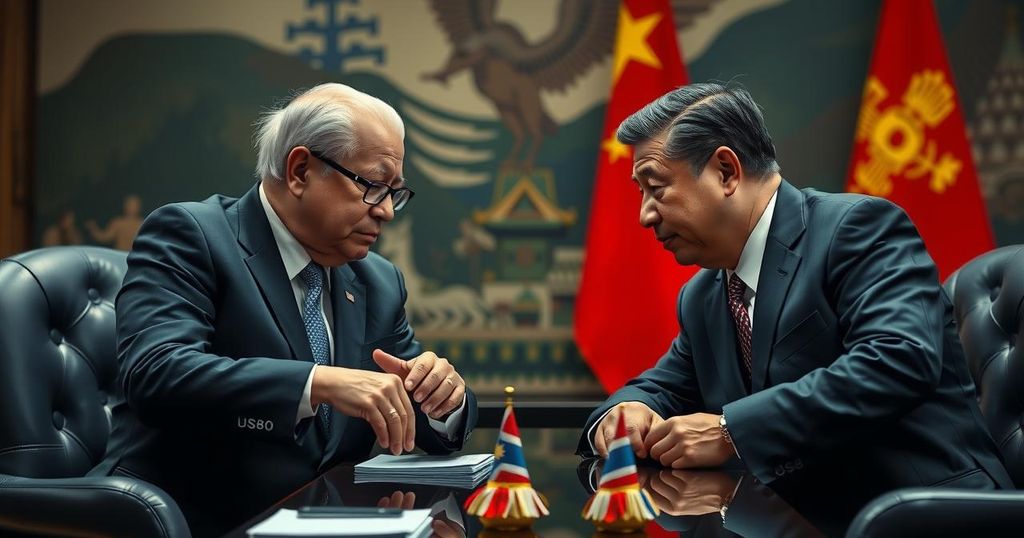Global news
AP, ASIA, ASIA - PACIFIC ECONOMIC COOPERATION, BID, BIDEN, BIDEN ADMINISTRATION, DIPLOMACY, ENERGY INFRASTRUCTURE, EUROPE/ASIA, GEOPOLITICS, HOUSE, INTERNATIONAL RELATIONS, KURSK, LIMA, MILITARY DRILLS, NORTH KOREA, PERU, RUSSIA, SOUTH AMERICA, TAIWAN, YOON, YOON SEOK YUL
Fatima Khan
0 Comments
Biden to Urge Xi on North Korea’s Support for Russia During Final Meeting
President Biden is expected to discuss North Korea’s support for Russia during his final meeting with President Xi Jinping in Peru. The leaders will explore ways to mitigate escalating tensions, especially with North Korea’s military actions. This meeting signifies ongoing complexities in U.S.-China relations as Biden prepares for a transition to Trump’s administration, amidst broader concerns over trade and regional security.
President Joe Biden is set to engage in crucial discussions with Chinese President Xi Jinping during his final meeting at the Asia-Pacific Economic Cooperation summit in Peru. Biden plans to urge Xi to utilize his influence to prevent North Korea from strengthening its support for Russia in the ongoing conflict in Ukraine. Following recent military support from North Korea to Russia, including troop assistance, Biden expressed the need for China to take a more proactive role in mitigating this dangerous cooperation. This dialogue is viewed as imperative, especially with the changing dynamics in U.S.-China relations as Biden prepares to hand over the presidency to Donald Trump. Concerns have been raised regarding North Korea’s escalating missile tests and its partnership with Russia, which have been met with frustration from the United States and its allies. The conversation will also encompass broader issues, such as China’s military presence in regional disputes and human rights concerns, signaling a multifaceted approach in addressing the complex relationship between the two nations. The significance of this meeting is underscored by the potential implications for American businesses operating in China amidst rising tensions, as many companies reassess their sourcing strategies in light of increasing tariffs and a shifting economic landscape. National security advisers have expressed that managing competition with China will remain a cornerstone of U.S. foreign policy under the incoming Trump administration, which may face significant challenges in addressing these multifarious dialogues with Beijing. Biden’s relationship with Xi has been a focal point throughout his political career, marked by both collaboration and contention. As the two leaders convene, there exists a vital opportunity to navigate the complexities of international relations, not only concerning North Korea and Russia but also in regard to technology transfers and military tensions in Asia. This meeting may well define the trajectory of future engagements between the United States and China.
The ongoing relationship between the United States and China remains contentious and complex, exacerbated by issues such as North Korean military activities, Chinese support for Russia, human rights concerns, and trade imbalances. This dynamic has been compounded by the COVID-19 pandemic and its aftermath, which brought global attention to supply chains and economic dependencies. President Joe Biden’s administration has sought to balance competition with China while addressing critical issues of national security. As Biden prepares to conclude his presidency, the focus has shifted to leveraging diplomatic channels with Chinese leadership to foster stability and prevent escalation in North Korea’s support for Russia. The upcoming transition to the Trump administration also raises questions about the future of U.S.-China relations, potentially impacting economic ties and strategic cooperation in the Asia-Pacific region.
The impending meeting between President Biden and President Xi presents an essential opportunity to address pressing international concerns. Emphasizing the need for China to moderate North Korea’s actions poses challenges and highlights the intricacies of global diplomacy. As the Biden administration prepares to transfer power to Donald Trump, the dialogue between these leading nations will be pivotal in shaping future interactions, with significant implications for regional stability and international trade. The outcomes of this engagement will significantly impact U.S.-China relations and the broader geopolitical landscape, underscoring the importance of continued diplomatic efforts.
Original Source: www.usnews.com




Post Comment